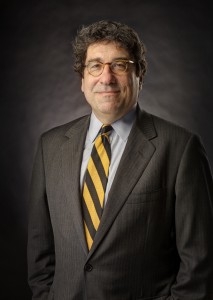You have /5 articles left.
Sign up for a free account or log in.

Nicholas S. Zeppos
Vanderbilt U.
Whoever sent a letter to faculty members at Vanderbilt University criticizing the leadership of Chancellor Nicholas S. Zeppos was dedicated: rather than a mass email, professors across campus each received a printed copy of the memo in their mailboxes one morning last week, urging them to take action to restore shared governance. Beyond that, though, there’s little public agreement among professors over whether the anonymous critics are heroes or cowards, spot-on in their arguments or wholly off base.
“Out of great concern for [Vanderbilt] and our desire to defend the standing of its faculty, we are writing to address the increasing misalignment between our academic needs and the support they receive at this university,” the letter reads. “We believe that [Zeppos’s] strategic priorities -- including building increasing numbers of new undergraduate dormitories; supporting large-scale university athletics; committing to a massively expensive undergraduate financial aid model; and centralizing administrative functions that have served only to increase our bureaucratic burden -- are entirely out of line with the academic priorities of many faculty.”
The letter -- which says it represents “the combined interests of faculty” from each of Vanderbilt’s schools and colleges -- asks the university’s Board of Trust to investigate a series of allegations “for the purpose of understanding the deteriorating condition of faculty experiences.” The letter also urges faculty members to discuss their concerns with colleagues and the Faculty Senate.
Among those more specific complaints is that Zeppos has created “a toxic organizational environment marked by fear and retribution for faculty and administrators who challenge the decision making of his central administration.” The letter alleges an “extreme centralization” of administrative functions as well as funds previously controlled by academic programs.
The letter also appears to take aim at Opportunity Vanderbilt, an undergraduate funding model guaranteeing that the university will meet each student’s demonstrated financial needs with grants and scholarships; the program replaced need-based loans in financial aid packages in 2009, a year after Zeppos was named chancellor. (He served as interim chancellor for a year after the departure of E. Gordon Gee for Ohio State University in 2007. Prior to that, he was provost under Gee.)
The undergraduate funding model “has forced upon on us one of the most costly undergraduate financial aid programs in the nation,” reads the memo, accusing the chancellor of paying for the program with money earmarked for academics when gifts and endowments fall short. Vanderbilt is hardly a poor university, with an endowment of $4 billion, but many of the colleges with similar financial aid programs are wealthier still.
Deans’ financial authority has been “eviscerated” under Zeppos’s tenure, the letter alleges, while “overzealous management” of university compliance programs is “suffocating the creative efforts of our faculty, particularly our colleagues in the medical school and School of Engineering.”
The power of the Faculty Senate, too, has suffered, and now serves as a “bureaucratic instrument of the central administration, rather than the intentional, representative body that our faculty so desperately need.”
Signing off as “Your concerned faculty colleagues,” the author or authors accuse Zeppos of “unilateral decision making” that threatens academic affairs and faculty autonomy, and which results in the Vanderbilt “hemorrhaging” money for “priorities with dubious academic returns and no end in sight.”
The university said it does not respond to anonymous letters, but it provided a general statement from Beth Fortune, vice chancellor for public affairs, “strongly affirming” Zeppos’s “deep commitment” to “recruiting and retaining world-class faculty and investing directly in their growth and success.”
Noting that Zeppos, a former law professor and provost at Vanderbilt, remains a member of the faculty, Fortune added, “These faculty draw the very best students to Vanderbilt to pursue their undergraduate and graduate studies and conduct the transformative research that enables the university to have a direct positive impact on the most pressing issues facing society today.”
Addressing Opportunity Vanderbilt, “which has allowed us to attract the very best students to our community, regardless of their ability to pay,” Fortune said that it was made possible with the help of donors. At the same time, she said, “the university continues to invest in faculty recruitment, research support and facility upgrades.”
Another university spokeswoman said there had been no significant changes to the university’s financial model.
But others on campus find the letter harder to shrug off. Lucius Outlaw, a longtime faculty member of philosophy at Vanderbilt and former associate provost, said he didn’t know who wrote the letter or what exactly had prompted it -- a few colleagues who he’d thought were involved said they weren’t when asked, he said. But Outlaw said it spoke to an increasingly poor climate on campus. He said he wasn’t intimidated by Zeppos or anyone else in the administration, but that some colleagues had adopted a kind of “keep your head down” mentality to avoid ruffling feathers or, worse, losing their jobs. He said that while some might view the letter’s author or authors as “cowards,” the fact that they didn’t sign their names also might illustrate the fear of retribution they discuss.
Outlaw said that Zeppos has a much less open decision-making process than Gee, his predecessor, who is well-known for being charismatic and engaging. But Outlaw said faculty members’ concerns couldn’t just be chalked up to Zeppos living in Gee’s shadow.
“You’ve got a culture that has been substantially conditioned by persons at the top,” he said, adding that some faculty members want a more “collaborative, consultative” relationship with the administration. “Personalities are reflected in how people govern and manage.”
But several professors also criticized the letter in an article in the student newspaper, The Vanderbilt Hustler. Bruce Oppenheimer, a professor of political science who was quoted in the article, said he didn't have time for an interview Wednesday but that he stood by his comments, including that he had “little respect for people who send unsigned letters, especially when they make such sweeping indictments. We don’t even know how many faculty members comprise this ‘concerned’ group.”
Oppenheimer also told The Hustler he thought a recent strategic planning process had been open and inclusive, contrary to what the letter says. He said he also supports the changes to student aid. “The decision to commit resources to student financial aid, especially meeting demonstrable need with grants instead of loans, has significantly improved the applicant pool and the quality and diversity of the student body," he said.
Paul C. H. Lim, associate professor of religious studies and chair of the Faculty Senate, referred all immediate questions to university officials.









